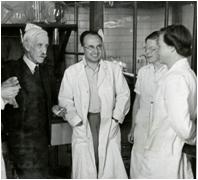Mentors, Networks and Careers
The vanguard of women biochemists relied upon the willingness and wiliness of the 1. Male Mentors
![]() who chose to support them in their chosen careers – often to mutual benefit
who chose to support them in their chosen careers – often to mutual benefit
2. Marriage
![]() led some women to leave biochemistry, although Cambridge in particular supported several couples who worked together on scientific research
led some women to leave biochemistry, although Cambridge in particular supported several couples who worked together on scientific research
For those who remained in science, alumni associations and professional women’s groups offered access to female-focused 3. Peer Support and Networking
![]()
The number of employed women biochemists increased, although there is some evidence that they became less likely to receive 4. Funding
 in the interwar period
in the interwar period
5. Patriarchical Attitudes
![]() still surfaced in academic biochemistry into the late 1930s, yet by this time several women had risen to positions of widely-recognised prominence in their fields
still surfaced in academic biochemistry into the late 1930s, yet by this time several women had risen to positions of widely-recognised prominence in their fields
Image: University Archives, Cambridge

